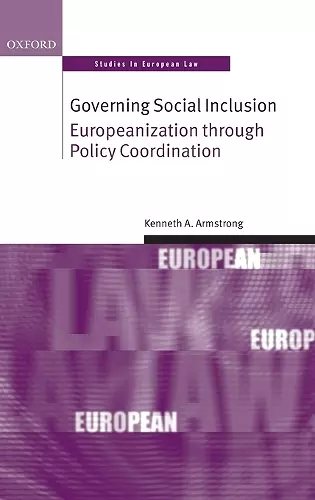Governing Social Inclusion
Europeanization through Policy Coordination
Format:Hardback
Publisher:Oxford University Press
Published:19th Aug '10
Currently unavailable, and unfortunately no date known when it will be back

Winner of the University Association for Contemporary European Studies 2011 book prize
From the Amsterdam Treaty to the Lisbon Strategy, there have been efforts to coordinate a European policy for social inclusion. In exploring these developments this book brings to the fore the emerging multi-level governance of social inclusion through its socio-legal and critical analysis of developments over the last decade.The pursuit of social solidarity and social justice has typically occurred within the boundaries of nation states. Yet in 2000, EU Member States committed themselves to make a decisive impact on the eradication of poverty and agreed to coordinate their activities within the framework of a novel governance process: the Open Method of Coordination (OMC). This book analyzes the emerging governance of social inclusion in the EU and the use of the OMC as a mechanism of Europeanization of domestic social policy. Armstrong's exploration of EU interventions to combat poverty and social exclusion addresses the changing constitutional, policy and governance context in which these interventions have occurred. It traces the impact of debates surrounding the Lisbon Treaty and the Lisbon Strategy in framing the possibilities and limits of EU action. Drawing on primary documentary material, on interviews with key actors and on a wide range of academic literature, this study offers a socio-legal account of the successes and failures of a decade of EU policy coordination. Utilizing the conceptual and theoretical tools associated with institutionalist analysis and experimental governance to develop the discussion of Europeanization, the book will be of value not only to scholars working on EU policymaking but also to those interested in changing patterns of public authority in the social sphere more generally.
...presents a valuable socio-legal approach of the emerging governance models in the social sphere that will be of interest to policy makers as well as to academics and students. * D.Xenos, European Review of Public Law *
...the book's great merit is to put issues of governance of European and private law, Europeanization, European multilevel governance, new modes of governance, and social policy into one analytical package and on the academic agenda. * Dr Gaby Umbach, European University Institute, Florence, Italy and University of Cologne, Germany *
As far as I am concerned, this is the book if one wants to know how the EU developed its social policy approach to poverty and social exclusion over the ten fateful years of the Lisbon Strategy. * Mary Daly, Queen's University Belfast, Northern Ireland *
In conclusion, this interdisciplinary book cannot be ignored by lawyers and will be of great interest to non-lawyers as it represents a challenging contribution to the literature on the fight against poverty, social protection, the OMC and European social law. * Claire Marzo, London School of Economics, UK *
- Winner of University Association for Contemporary European Studies 2011 book prize.
ISBN: 9780199278374
Dimensions: 241mm x 163mm x 26mm
Weight: 682g
354 pages